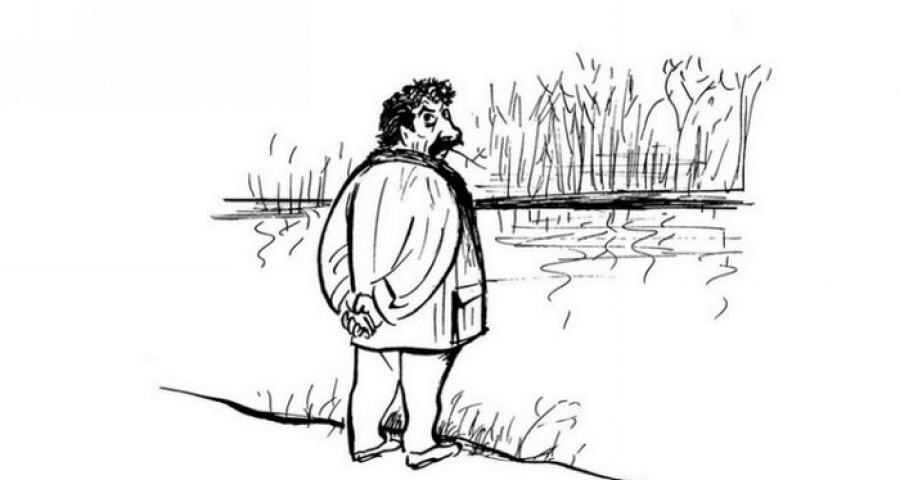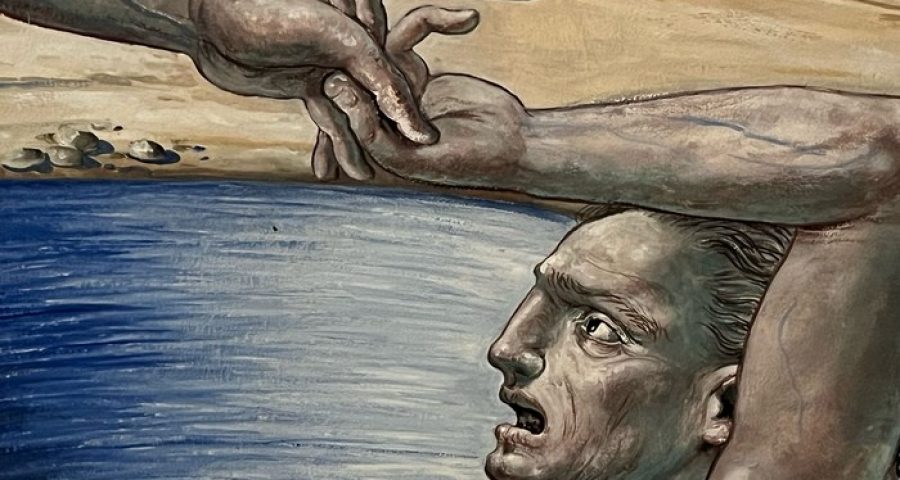In the belly of the Word/8 - The Bible is the absolute guardian and so it has maintained its effectiveness
Luigino Bruni
published in Avvenire on 07/04/2024
Look you now, how ready mortals are to blame the gods.
Homer, Odyssey 1.32 -33 , in Nietzsche, Genealogy of Morals, p. 84
“When God saw what they did, how they turned from their evil ways, God changed his mind about the calamity that he had said he would bring upon them; and he did not do it.” (Jonah 3:1-10). The biblical God has many qualifying adjectives (merciful, just, good...). They include: ‘capable of repentance’. In fact, the Bible shows us a God who changes his mind, his perspective, because it is part of agape love to know how to change, indeed it is an essential part of it. Because if the biblical God is the guarantor of our loves and forgiveness, then he must also be able to repent and change his perspective, because it is in these changes of perspective and in these repentances that the soul of human relationships is found.
The third chapter of Jonah concludes with this metanoia of YHWH, a closure that could also be a good conclusion to the book. And yet that ancient author wanted to give us a final beautiful chapter, opened by another adversarial conjunction, another ‘but’: "But this was very displeasing to Jonah, and he became angry." (4:1) Other translations write: ‘Jonah felt an enormous anger’ (L. Alonso Schökel); ‘And it was evil to Jonah, very evil and he became angry’ (Erri de Luca); ‘Jonah felt deeply upset and became angry’ (Donatella Scialoia).
Then "Jonah prayed to YHWH and said, ‘O Lord! Is not this what I said while I was still in my own country? That is why I fled to Tarshish at the beginning; for I knew that you are a gracious God and merciful, slow to anger, and abounding in steadfast love, and ready to relent from punishing. And now, O Lord, please take my life from me, for it is better for me to die than to live.’”(4:2-3) God replied to his prayer that here turned into a protest: "‘Is it right for you to be angry?" (4:4). Jonah did not reply with more words but with his feet: “Then Jonah went out of the city and sat down east of the city, and made a booth for himself there. He sat under it in the shade" (4:5). Like us, when we end a fight by slamming a door and the dialogue continues by not returning to dinner.
Although many have tried to dampen the theological and ethical force of this passage and the entire book by attributing the humorous literary genre to the text (forgetting, among other things, that biblical humour is also theological), I believe that here we are faced with one of the most important passages of the entire Bible. Jonah argues with God, criticizes his actions. He talks to God to protest, to argue with him. Just like Job. But Job was not a prophet, he was ‘only ’a righteous man. The value of these verses of the book of Jonah lies in the nature-vocation of its protagonist: Jonah was a prophet, he dialogued with God by protesting, and this quarrel was called prayer - in the Bible, quarrelling is a form of prayer. From the first chapters of Genesis, we already know that homo biblicus was a being capable of dialogue with God; now, even though we had glimpsed it indirectly with Jeremiah (Chap. 20), with Jonah we discover that controversy with God is part of the repertoire even of the nabi, the prophet: he is not a passive executor of orders, he speaks his mind, protests before during and after receiving words.
Much of the biblical anthropological dignity is found in these dialogues, in these arguments between earth and heaven, which reveal to us an Adam created so free that he could (almost) converse on an equal footing with God - ‘yet you have made them a little lower than God’ (Psalm 8). Homo biblicus has been equipped with a dignity so high as to become infinite: he is not a being submissive to a sovereign, he is not a subject, he is not a servant: he is a son, and like all free children he occasionally quarrels with his parents, because quarrelling with our father and mother is an essential part of the good work of children (and parents): slaves do not quarrel with their masters; sons and the daughters do and by quarrelling they tell their father that he is not their master - fraternity between children and parents begins with quarrelling.
In this protest of Jonah there is then a root of the process that over the centuries has led women and men to free themselves from a God-master and therefore to quarrel with God about the innocent suffering of the world, injustices, wickedness and genocides. Jonah is behind the pages of Dostoevsky's Grand Inquisitor, behind Nietzsche's madman who announced the killing of God in the market, behind all those who continue to quarrel with God because they are not satisfied with simplistic answers - and what if behind what today appears to be atheism or great indifference there was a long and deep struggle with God?
Why did Jonah get angry with God? There have always been many answers, from the nationalism of Jonah (the conversion of a pagan city was a condemnation of the non-conversion of Israel) to the pettiness of Jonah who was angry only because God made him look bad in front of the inhabitants of Nineveh, making him appear as a false prophet or charlatan. Whereas I believe, that in the light of the entire Bible (and human history) we can look for different, more creative explanations. However, what is certain is that for Jonah ‘that conversion of God’ was something very serious and vital, to the point that he asked God to let him die - take my life. Here Elijah comes back, another great companion of Jonah’s journey, who welcomed him under the broom tree of his spiritual depression (1 Kings 19: 4).
We understand a first dimension of Jonah's anger if we look at some stories of people who with freedom and sincerity, have tried to follow, a voice. After a first protest and a first ‘no’ that led us in the wrong direction (Tarshish), one day comes a shock a, an unexpected and providential event that converts us and puts us back on the path we had not wanted to follow at the beginning. We return home meekly, the father kills the fatted calf and maybe even that time the older brother participates in the banquet. We resume our ‘trade’, we finally carry out the task. We arrive at Nineveh, we bring the message we were supposed to bring and there another surprise awaits us: this time it is not we who change, it is God who converts and surprises us again. The first reaction in these second swerves is often that of Jonah: ‘since I knew that you are merciful and compassionate and change your mind, I fled to Tarshish because I did not believe that you would keep your word’. Finally we have the explanation that Jonah himself gives for his disobedience: Jonah did not believe that this threat of destruction was credible. We convince ourselves that we were right to disobey the first time, and so we were wrong to convert later - ‘I knew I shouldn't have changed my mind that time, what a fool I was, I threw my life away!’. Tremendous experiences because, unlike Jonah's story, years, decades can pass in our lives between the first no and the last quarrel, there is the investment of the best years of our lives. Finding yourself alone in a booth is almost always accompanied by ruins, melancholy, depression, lost health, ruthless, inconsolable and desperate readings of our past. It is the time of remorse and regret, which sometimes produces a more violent anger than that of Jonah. In the worst cases, these poisoned people spend the rest of their lives nourishing themselves on their own anger, until they die intoxicated, as if because of an auto-immune disease. It is possible (but not easy!) to successfully overcome Jonah's stage in the booth if, one day, that knot of the soul is untied and finally we understand that what matters is our life today and that a new and better life can begin tomorrow– we can rise again even at 70 or 90 years old; and it becomes evident that what we have learned about life, about ourselves and about God, is an inheritance of infinite value, which surpasses all the high costs incurred; it is the guarantee of the present and the future. And a wonderful phase of life begins, anger blossoms into gentleness and piety and you feel at the centre of an infinite gratuitous love never known before.
But in this stage of Jonah there is still something else, there may be something else.
The prophets are the great lovers of the word, we know that. That is why they are also its guardians; what we know less is that the prophets are also the defenders of the word towards God. The first, essential and vital task of the prophet is to protect the word, even when the issuer of that word changes his mind, to the point of defending the word of God from God. The whole Bible is the guardian (shomer) of the word, an absolute guardianship that has allowed it to preserve its effectiveness, its great gift in our time populated by endless chatter. If Isaac (Gen. 27), having discovered the trickery of Jacob, had withdrawn and annulled the word spoken, the entire biblical word would have lost its power and value; and even the absurd and gruesome story of the daughter of Jephthah (Jdg. 11:34 ff.) tells of the infinite cost-value of the biblical word. But while the various biblical characters defend the truth of God's word, the prophets do something more and unheard of: they defend the word from God. It is then too little, and banal, to think that Jonah is angry with God because by changing his mind, he made him look bad in Nineveh. It is much more biblical to think that Jonah was defending the truth of God's word and that is why he gets angry. And so he proves that he is a true prophet: because what interests him is not to make God and his word look bad, not himself. This special guardianship of the word for the prophet is more important than God's ability to convert - the Bible is full of contrasts between good values, e.g. truth and love - because if the word is not a solid rock, the nature of its vocation is lost and with it the robust boundary between true and false prophets. There is also this total fidelity to the word within the Prologue of the Gospel of John: that word-logos which became flesh gave the flesh an infinite dignity because the whole Bible, with the prophets, had made the dignity of the word infinite.
The paradox of Jonah opens within the paradox of prophecy, a paradox of a prophet’s obedience to the word more radical than obedience to God, and for this reason he protects God as his ally would, not his slave.
We are not prophets; nevertheless, we can intuit something of this vital paradox of prophecy: those who in life have had a task and have carried it out with truth and responsibility, know that the crucial days were those of protecting of that word (task or work) by whoever entrusted it to them. They had to keep believing in it when the person who had ‘called’ them no longer spoke or had changed his mind. And within paradoxical fidelity their true vocation flourished.













